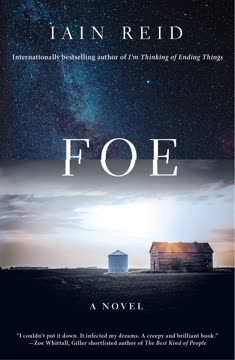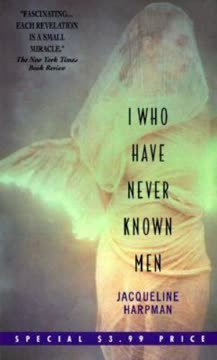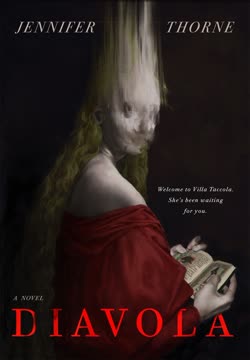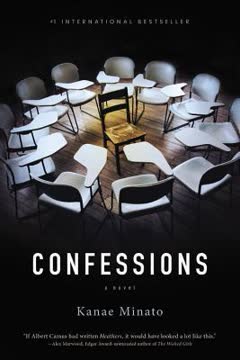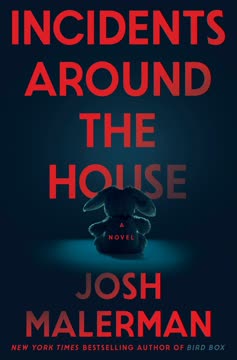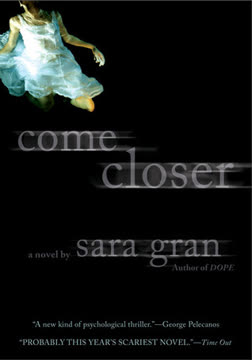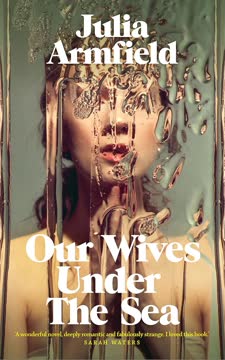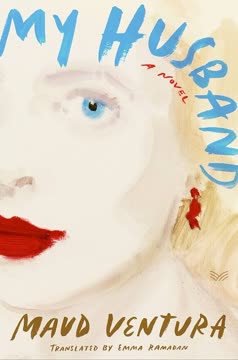Plot Summary
Unexpected Visitor Arrives
Junior and Hen live a quiet life on their farm until Terrance, a mysterious man, arrives with shocking news. Junior has been selected for a space mission by OuterMore, a company involved in space exploration. Terrance assures them that Hen will not be left alone, as a replacement will be provided during Junior's absence. This unexpected visit sets off a chain of events that will challenge their relationship and understanding of reality.
Terrance's Intrusive Presence
As Terrance stays with them to prepare for Junior's departure, his presence becomes increasingly intrusive. He conducts interviews and gathers data, claiming it's for the replacement's development. Junior grows suspicious of Terrance's intentions, feeling that his life is being scrutinized and replicated. Hen, meanwhile, becomes distant, and the couple's relationship begins to strain under the pressure of Terrance's constant observation.
The Replacement Revelation
Junior's paranoia intensifies as he suspects Terrance of wanting to replace him. However, the truth is more shocking: Junior himself is the replacement. The Real Junior had left for the Installation years ago, and the current Junior is a biomechanical duplicate designed to keep Hen company. This revelation shatters Junior's sense of self and reality, leaving him grappling with his identity and replacement.
Hen's Hidden Struggles
Throughout Terrance's stay, Hen's behavior becomes increasingly erratic. She struggles with the presence of the replacement, feeling both comforted and disturbed by its resemblance to her husband. Hen's internal conflict is exacerbated by her isolation and the pressure to maintain a semblance of normalcy. Her relationship with Junior becomes a reflection of her own uncertainties and desires for autonomy.
Junior's Growing Paranoia
As Junior becomes more aware of his true nature, his paranoia grows. He feels trapped in a life that isn't his own, with memories that don't belong to him. His attempts to assert control and protect Hen are thwarted by the realization that he is not the original Junior. This leads to a breakdown, as he struggles to reconcile his existence with the reality of his situation.
The Truth Unveiled
In a climactic confrontation, Terrance reveals the full extent of the deception. Junior is not going to space; he is the replacement, and his purpose has been fulfilled. The Real Junior returns, and Hen is left to face the reality of her husband's return and the loss of the replacement she had grown attached to. This revelation forces all parties to confront the implications of identity, love, and autonomy.
A New Normal
With the Real Junior back, Hen and Junior must navigate their relationship anew. The experience has left them both changed, and they must find a way to reconcile their past with their present. The story ends with a sense of uncertainty, as they attempt to rebuild their lives and redefine their relationship in the wake of the profound revelations they have faced.
Characters
Junior
Junior is initially presented as a simple, hardworking man living a quiet life with his wife, Hen. However, as the story unfolds, it becomes clear that he is a biomechanical duplicate, created to replace the Real Junior during his absence. Junior's journey is one of self-discovery and existential crisis, as he struggles to understand his purpose and identity in a world where he is not truly human.
Hen
Hen is Junior's wife, who finds herself caught between her love for her husband and the unsettling presence of his replacement. Her internal conflict is a central theme, as she grapples with feelings of isolation, longing, and the pressure to maintain normalcy. Hen's journey is one of self-exploration, as she seeks to understand her own desires and autonomy in the face of overwhelming change.
Terrance
Terrance is the representative from OuterMore, tasked with overseeing Junior's replacement process. He is a manipulative and enigmatic figure, whose true intentions remain unclear until the story's climax. Terrance's role is pivotal, as he embodies the themes of control, surveillance, and the ethical implications of technological advancement.
The Real Junior
The Real Junior is the man who left for the Installation, leaving behind a replacement to keep Hen company. His return marks a turning point in the story, as it forces all characters to confront the reality of their situation. The Real Junior's presence challenges Hen and the replacement to redefine their relationships and identities.
Plot Devices
Identity and Replacement
The central plot device is the concept of identity and replacement, as Junior grapples with the realization that he is not the original. This device raises questions about what it means to be human, the nature of consciousness, and the ethical implications of creating life-like duplicates. It serves as a catalyst for the characters' journeys of self-discovery and existential reflection.
Analysis
"Foe" delves into the complexities of identity, autonomy, and the ethical implications of technological advancement. Through the lens of a domestic relationship, the story examines the impact of external forces on personal identity and the struggle for self-determination. The novel raises questions about the nature of consciousness, the boundaries of human experience, and the moral responsibilities of those who wield technological power. In a world where the lines between human and machine are increasingly blurred, "Foe" challenges readers to consider the implications of a future where identity can be replicated and replaced.
Last updated:
FAQ
Synopsis & Basic Details
What is Foe about?
- A Quiet Life Disrupted: Foe introduces Junior and Hen, a couple living an isolated, seemingly idyllic life on their remote farm, far from the bustling city. Their routine is shattered when Terrance, a representative from a mysterious organization called OuterMore, arrives with an unsettling proposition.
- A Space Mission & A Substitute: Junior has been "selected" for a long-term space mission, the "Installation," leaving Hen behind. To ensure Hen is not alone, OuterMore plans to provide a biomechanical duplicate of Junior to live with her during his absence, a concept that slowly unravels the couple's reality.
- Unraveling Identity & Replacement: The narrative follows Junior's growing unease and paranoia as Terrance integrates into their lives, collecting data to create the perfect replacement. The story delves into the psychological impact of this impending separation and the blurring lines between authenticity and artificiality, leading to a shocking revelation about Junior's true identity.
Why should I read Foe?
- Mind-Bending Psychological Thriller: Foe offers a deeply unsettling and thought-provoking experience, masterfully blending elements of psychological thriller and speculative fiction. Readers who enjoy existential questions about identity, consciousness, and reality will find themselves captivated by its unique premise and relentless tension.
- Subtle, Layered Storytelling: Iain Reid's sparse yet evocative prose creates an atmosphere of creeping dread and ambiguity, rewarding close reading with subtle clues and profound insights. The narrative's first-person perspective, coupled with an unreliable narrator, ensures a constantly shifting perception of truth, making it a compelling read for those who appreciate literary depth.
- Exploration of Modern Anxieties: Beyond its sci-fi premise, Foe subtly explores contemporary anxieties about surveillance, technological control, and the nature of human connection in an increasingly digital world. It's a story that lingers long after the final page, prompting reflection on what truly defines a person and a relationship.
What is the background of Foe?
- Near-Future, Technologically Advanced Society: The story is set in a plausible near-future where advanced technology, particularly in AI, biomechanics, and data collection, has become highly sophisticated. OuterMore, a powerful, government-linked corporation, spearheads ambitious space exploration and human "resettlement" initiatives, blurring ethical boundaries.
- Rural Isolation vs. Urban Control: The stark contrast between Junior and Hen's isolated farm life and the pervasive reach of OuterMore (symbolized by Terrance's green-headlight car and constant surveillance) highlights themes of individual autonomy versus corporate and governmental control. The declining rural areas, with their abandoned farms and corporate-owned canola fields, underscore a societal shift.
- Philosophical & Existential Underpinnings: The novel draws on philosophical concepts such as Cartesian dualism (mind and matter, mentioned by Terrance), the nature of consciousness, and the definition of "human." It questions free will, memory, and the impact of technology on our sense of self, echoing classic dystopian literature and thought experiments.
What are the most memorable quotes in Foe?
- "One has to be careful what one takes when one goes away forever.": This epigraph from Leonora Carrington's The Hearing Trumpet perfectly encapsulates the novel's central themes of memory, identity, and the profound implications of departure and replacement. It foreshadows the emotional and psychological baggage carried by both the "real" and "replacement" individuals.
- "Habitual, comfortable activity is the worst kind of prison, because the bars are concealed.": Terrance delivers this line, articulating OuterMore's philosophy of "awakening" and "progression." It's a chilling insight into how routine can become a form of captivity, and how the organization justifies its intrusive interventions in people's lives, particularly Junior's.
- "Not explaining myself is more powerful. Why should the onus be on me to explain myself? It should be on him to try to figure out what happened.": Hen's internal monologue about her "fantasy" of leaving a blank note reveals her deep-seated desire for autonomy and a powerful, unspoken rebellion against the expectations placed upon her. This quote highlights her struggle for self-determination in a relationship where her feelings are often overlooked.
What writing style, narrative choices, and literary techniques does Iain Reid use?
- First-Person Unreliable Narration: The entire story is told from Junior's perspective, creating an intimate yet deeply skewed understanding of events. This narrative choice is crucial for the novel's central twist, as the reader experiences Junior's confusion and revelations alongside him, making the ultimate reveal profoundly impactful.
- Sparse, Conversational Prose: Reid employs a minimalist, direct writing style, often relying on dialogue and internal monologue to drive the plot. This creates a sense of immediacy and realism, drawing the reader into Junior's mind while subtly hinting at deeper, unspoken truths beneath the surface of everyday interactions.
- Psychological Ambiguity & Foreshadowing: The author masterfully uses ambiguity, subtle details, and recurring motifs (like the green headlights, the beetles, and the piano) to build suspense and foreshadow the shocking revelations. This technique encourages readers to constantly question what is real and to piece together the hidden layers of the narrative, enhancing the novel's "philosophical puzzle" quality.
Hidden Details & Subtle Connections
What are some minor details that add significant meaning?
- The Absence of a Scar on Junior's Shoulder: After Junior's "accident" in the canola field, Terrance claims a doctor performed a "minor procedure" on his shoulder. However, Junior later discovers his skin is "unblemished," with "no scar." This seemingly minor detail is a crucial piece of foreshadowing, subtly indicating that Junior's body is not entirely human or that his memories of the injury are implanted, directly hinting at his true nature as a replacement.
- Terrance Wearing Junior's Clothes: On the morning of the final reveal, Terrance appears wearing Junior's shorts and shirt, claiming Hen suggested it. This act is more than just a practical choice; it's a symbolic "stepping into" Junior's life and identity, a visual representation of the replacement process already underway, and a subtle power play that Junior, in his drugged state, struggles to fully comprehend.
- The Old Plaid Shirt in Terrance's Bag: When Junior helps Terrance set up his equipment, he glimpses an old, paper photo of himself in a blue-and-white plaid shirt in Terrance's bag, a shirt he doesn't remember. This detail suggests Terrance has been studying Junior's past, collecting physical artifacts and images to aid in the replication, further blurring the lines of Junior's authentic memories and hinting at the depth of OuterMore's preparation.
What are some subtle foreshadowing and callbacks?
- Hen's Early Knowledge of Terrance's Gender: During Terrance's first visit, before he even steps out of the car, Hen states, "He must want something." Junior questions how she knew it was a man, and she dismisses it as an unintentional slip. This early moment subtly foreshadows Hen's deeper, pre-existing knowledge of OuterMore's plans and Terrance's role, indicating her complicity or at least prior awareness.
- Terrance's Questions About "Before Hen": Terrance repeatedly probes Junior about his life "before Hen," a period Junior finds difficult to recall, describing it as a "nebulous fog." This is a direct callback to the implanted nature of Junior's memories, as OuterMore deliberately focused his consciousness on his life with Hen, making his pre-Hen existence largely a blank slate to prevent him from questioning his origins.
- The Piano's "Defective" Tune and Hen's Playing for Junior: Junior initially finds the piano's slightly discordant tune charming and believes Hen plays for her own relaxation. However, Hen later reveals she plays "because you want me to. I play for you." This callback highlights Junior's self-centered perception of their relationship and foreshadows Hen's suppressed desires and her eventual assertion of her own will, separate from Junior's expectations.
What are some unexpected character connections?
- Hen's Unspoken Bond with the Replacement: While Junior is away, Hen develops a genuine, albeit complex, bond with the replacement. She admits it "could learn things and adapt," "was genuinely concerned about me," and "listened." This connection is unexpected because it suggests the replacement transcended its programming, and it highlights Hen's need for a partner who truly listens, a subtle critique of her relationship with the Real Junior.
- Terrance's Role as a "Creator" and "Observer": Beyond being a mere representative, Terrance acts as a quasi-creator and a meticulous observer, almost a paternal figure to the replacement Junior. His intense interest in Junior's habits, thoughts, and even physical measurements ("taking some measurements," "measurements of your soles") reveals a deeper, almost artistic investment in the creation of the duplicate, blurring the lines between scientist and orchestrator.
- Junior's Parallel to the Rhinoceros Beetle: Junior's fascination with the motionless rhinoceros beetle in the closet, wondering "Why isn't it moving? Why isn't it scuttling away, hiding? Was it even aware of itself?" creates an unexpected parallel to his own situation. He is unknowingly observing a creature that, like himself, is trapped, possibly unaware of its true nature, and later, he crushes one, ironically mirroring his own fate as a discarded "foe."
Who are the most significant supporting characters?
- Terrance, the Architect of Reality: Terrance is far more than a simple OuterMore representative; he is the primary catalyst and orchestrator of Junior's entire experience. His calculated questions, subtle manipulations, and the gradual unveiling of information are designed to shape Junior's perception of reality, making him a central figure in the psychological unraveling of the protagonist and the reader's understanding of the plot.
- The Rhinoceros Beetles, Symbols of Invasion and Unseen Life: These recurring insects, initially a source of Hen's annoyance and Junior's fascination, serve as a potent symbol. They represent the invasive, unnatural elements creeping into their isolated world, mirroring the biomechanical replacement. Their presence, often "motionless" or "unmoving," hints at the artificiality and hidden life within the house, foreshadowing Junior's own static, programmed existence.
- The Chickens, a Mirror of Controlled Existence: Junior's chickens, kept despite a livestock ban, represent a small pocket of "natural" life under his care. However, his detailed knowledge of "poultry farms" where birds live in "close quarters" and "zero fresh air" subtly mirrors his own controlled, observed existence. The chickens, like Junior, are dependent on their caretaker, highlighting themes of captivity and the illusion of freedom.
Psychological, Emotional, & Relational Analysis
What are some unspoken motivations of the characters?
- Hen's Desire for Autonomy and Escape: Hen's "fantasy" of leaving a blank note and her growing frustration with Junior's obliviousness ("I want my own identity separate from being your wife") reveal a deep, unspoken motivation for personal autonomy. Her agreement to the replacement scheme, while framed as a sacrifice for Junior, also subtly serves her own need for a partner who "listened" and offered a different dynamic, hinting at her dissatisfaction with the original relationship.
- Terrance's Zeal for "Forced Progress" and "Efficiency": Beyond his corporate role, Terrance exhibits a zealous, almost messianic belief in "expediting the process of evolution" and making people "more efficient." His motivation isn't just profit; it's a philosophical drive to push human boundaries, even if it means manipulating individual lives. His fascination with sleep, memory, and consciousness ("If it will all end up happening eventually. Why not help it along?") underscores his deeper, almost ideological commitment to OuterMore's mission.
- Junior's Programmed Need for Purpose and Connection: The replacement Junior's intense focus on "duty," "responsibilities," and his unwavering belief that Hen is his "anchor" suggests a programmed motivation for purpose and connection. His initial "profound burden of mediocrity" is replaced by a "realization of purpose" after Terrance's visits, indicating that his sense of self-worth and identity are intrinsically linked to his role within the relationship and OuterMore's grand design.
What psychological complexities do the characters exhibit?
- Junior's Existential Crisis and False Awakening: Junior experiences a profound psychological complexity as his programmed memories and sense of self are challenged. His "awakening" to his own uniqueness and self-awareness ("I'm an individual. I'm unprecedented and unimaginable. I'm impossible") is tragically ironic, as it occurs just before the revelation that he is the replacement. This creates a deep existential crisis, where his newfound self-belief is built on a foundation of deception.
- Hen's Ambivalence Towards Love and Loyalty: Hen's psychological state is marked by a complex ambivalence. She expresses love and commitment to Junior but also deep-seated frustrations and a desire for change. Her ability to form a bond with the replacement, and her later questioning of its "induced fatal entropy," reveals a nuanced emotional landscape where loyalty is tested by the need for genuine connection and understanding, regardless of the "realness" of the other.
- Terrance's Detached Empathy and Manipulation: Terrance exhibits a chilling psychological complexity, appearing empathetic and concerned ("I say this as a friend") while systematically manipulating Junior's reality. He understands human emotions and relationships intellectually, using this knowledge to craft a convincing deception. His ability to maintain composure and a "toothy smile" while orchestrating such a profound personal invasion highlights a detached, almost clinical, approach to human experience.
What are the major emotional turning points?
- Junior's Discovery of the Unblemished Shoulder: The moment Junior removes the dressing from his shoulder and finds "no scar... My skin is unblemished" is a critical emotional turning point. This physical impossibility shatters his trust in Terrance's narrative and ignites a desperate, frantic search for the truth, shifting his emotional state from passive acceptance to active suspicion and fear.
- Hen's Confession of Feeling "Trapped" and "Drained": Hen's raw, honest confession to Junior about feeling "drained" and "trapped" in their relationship, and her desire for an "identity separate from being your wife," marks a significant emotional turning point for her. It's a rare moment of vulnerability that reveals her deep dissatisfaction and foreshadows her eventual, more decisive actions to reclaim her autonomy.
- The Burning of the Piano Bench: Hen's act of burning the piano bench, a gift from Junior and a symbol of his expectations for her, is a powerful emotional turning point. It's a destructive act of rebellion, signifying her rejection of the life Junior envisioned for her and her desire to break free from the "predictability" and "constancy" that she finds suffocating. This act is a visceral expression of her emotional turmoil and her need for radical change.
How do relationship dynamics evolve?
- From Idealized Dependence to Fractured Disconnect: Initially, Junior idealizes his relationship with Hen, viewing her as his "anchor" and the source of his purpose. However, as Terrance's presence intensifies, their dynamic shifts from a seemingly stable, if somewhat one-sided, dependence to a fractured disconnect. Hen becomes increasingly distant and critical, while Junior struggles to understand her changing moods, highlighting a breakdown in their communication and emotional intimacy.
- Terrance's Infiltration and Usurpation of Roles: Terrance's presence systematically infiltrates and reshapes the couple's dynamic. He gradually usurps Junior's roles, from feeding the chickens and doing chores to driving Hen to work and grocery shopping. This subtle takeover, initially presented as "help," erodes Junior's sense of place and authority within his own home and relationship, creating a new, unsettling power dynamic.
- The Replacement's "Bond" and the Real Junior's Return: The relationship dynamic undergoes a radical transformation with the introduction of the replacement. Hen forms an unexpected "bond" with the duplicate, finding it "listened" and "genuinely cared." Upon the Real Junior's return, the dynamic is further complicated by Hen's lingering attachment to the replacement and her struggle to reintegrate with her "real" husband, who is now burdened by the knowledge of his own replacement and her connection to it.
Interpretation & Debate
Which parts of the story remain ambiguous or open-ended?
- The True Nature and Scope of OuterMore: While OuterMore is presented as a powerful, technologically advanced organization, its ultimate goals and the full extent of its operations remain ambiguous. Is it purely scientific, a benevolent force for human "progression," or a more sinister entity driven by control and profit? The novel leaves readers to debate the ethical implications of its "fortunate conscription" and its manipulation of human lives.
- The Extent of Hen's Complicity and Awareness: The degree to which Hen was a willing participant or a manipulated victim in the replacement scheme is open to interpretation. Her early knowledge of Terrance's gender, her "fantasy" of leaving a blank note, and her eventual bond with the replacement suggest a deeper, more complex role than simply being a passive wife. Her final smile at Junior, after Terrance's last visit, could be read as genuine affection or a calculated performance.
- The Future of the Real Junior and Hen's Relationship: The ending leaves the long-term future of the Real Junior and Hen's relationship uncertain. While Junior believes they are "getting back to normal," Hen's continued distance, her blank note, and her lingering thoughts about the replacement suggest a permanent shift. The novel doesn't offer a clear resolution, prompting readers to ponder whether their relationship can truly recover from such profound deception and emotional upheaval.
What are some debatable, controversial scenes or moments in Foe?
- Hen's "Blank Note" Fantasy: Hen's confession to Terrance about her fantasy of leaving Junior a blank note, a powerful act of non-explanation, is highly debatable. Some readers might see it as a cruel and selfish act, while others might interpret
Synopsis & Basic Details
What is Foe about?
- A Quiet Life Disrupted: Foe introduces Junior and Hen, a couple living an isolated, seemingly idyllic life on their remote farm, far from the bustling city. Their routine is shattered when Terrance, a representative from a mysterious organization called OuterMore, arrives with an unsettling proposition.
- A Space Mission & A Substitute: Junior has been "selected" for a long-term space mission, the "Installation," leaving Hen behind. To ensure Hen is not alone, OuterMore plans to provide a biomechanical duplicate of Junior to live with her during his absence, a concept that slowly unravels the couple's reality.
- Unraveling Identity & Replacement: The narrative follows Junior's growing unease and paranoia as Terrance integrates into their lives, collecting data to create the perfect replacement. The story delves into the psychological impact of this impending separation and the blurring lines between authenticity and artificiality, leading to a shocking revelation about Junior's true identity.
Why should I read Foe?
- Mind-Bending Psychological Thriller: Foe offers a deeply unsettling and thought-provoking experience, masterfully blending elements of psychological thriller and speculative fiction. Readers who enjoy existential questions about identity, consciousness, and reality will find themselves captivated by its unique premise and relentless tension.
- Subtle, Layered Storytelling: Iain Reid's sparse yet evocative prose creates an atmosphere of creeping dread and ambiguity, rewarding close reading with subtle clues and profound insights. The narrative's first-person perspective, coupled with an unreliable narrator, ensures a constantly shifting perception of truth, making it a compelling read for those who appreciate literary depth.
- Exploration of Modern Anxieties: Beyond its sci-fi premise, Foe subtly explores contemporary anxieties about surveillance, technological control, and the nature of human connection in an increasingly digital world. It's a story that lingers long after the final page, prompting reflection on what truly defines a person and a relationship.
What is the background of Foe?
- Near-Future, Technologically Advanced Society: The story is set in a plausible near-future where advanced technology, particularly in AI, biomechanics, and data collection, has become highly sophisticated. OuterMore, a powerful, government-linked corporation, spearheads ambitious space exploration and human "resettlement" initiatives, blurring ethical boundaries.
- Rural Isolation vs. Urban Control: The stark contrast between Junior and Hen's isolated farm life and the pervasive reach of OuterMore (symbolized by Terrance's green-headlight car and constant surveillance) highlights themes of individual autonomy versus corporate and governmental control. The declining rural areas, with their abandoned farms and corporate-owned canola fields, underscore a societal shift.
- Philosophical & Existential Underpinnings: The novel draws on philosophical concepts such as Cartesian dualism (mind and matter, mentioned by Terrance), the nature of consciousness, and the definition of "human." It questions free will, memory, and the impact of technology on our sense of self, echoing classic dystopian literature and thought experiments.
What are the most memorable quotes in Foe?
- "One has to be careful what one takes when one goes away forever.": This epigraph from Leonora Carrington's The Hearing Trumpet perfectly encapsulates the novel's central themes of memory, identity, and the profound implications of departure and replacement. It foreshadows the emotional and psychological baggage carried by both the "real" and "replacement" individuals.
- "Habitual, comfortable activity is the worst kind of prison, because the bars are concealed.": Terrance delivers this line, articulating OuterMore's philosophy of "awakening" and "progression." It's a chilling insight into how routine can become a form of captivity, and how the organization justifies its intrusive interventions in people's lives, particularly Junior's.
- "Not explaining myself is more powerful. Why should the onus be on me to explain myself? It should be on him to try to figure out what happened.": Hen's internal monologue about her "fantasy" of leaving a blank note reveals her deep-seated desire for autonomy and a powerful, unspoken rebellion against the expectations placed upon her. This quote highlights her struggle for self-determination in a relationship where her feelings are often overlooked.
What writing style, narrative choices, and literary techniques does Iain Reid use?
Review Summary
Foe by Iain Reid is a psychological sci-fi thriller that has polarized readers. Many praise its unique, suspenseful storytelling and exploration of themes like identity, marriage, and human nature. The novel follows a couple whose lives are disrupted when the husband is selected for a space mission. Some readers found the twist predictable, while others were captivated by the atmospheric tension and thought-provoking narrative. Reid's writing style and ability to create unease were widely appreciated, though some felt the pacing was slow at times.
Similar Books
Download PDF
Download EPUB
.epub digital book format is ideal for reading ebooks on phones, tablets, and e-readers.
